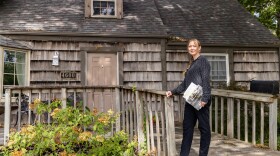Asleep at the Wheel bandleader Ray Benson moved to Austin in the early �70s at the urging of Willie Nelson. But there was another reason he moved here.
“Well, rent was cheap and pot was cheap, you know?� he said.
Back then, he and his roommates lived off South First, splitting the $250 rent four ways. That cheap rent allowed musicians and people in the industry to live a quality life in Austin.
That’s pretty common, says Michael Seman, assistant professor of arts management at Colorado State University.
“Inexpensive housing is a huge driver of scenes and ecosystems and the broader creative economy,� he says.
People in Austin’s music ecosystem historically haven’t made much money.
“What I think surprised a lot of people when the came out is that 20% percent of � musicians are below the poverty line; about another 30% hover just right above it,� says Nikki Rowling, who conducted the study.
So the Austin music industry has had to depend on affordable housing to thrive. But, says Rowling, musicians� incomes have “not kept up with the times or inflation or affordability issues in any way.�
Musicians have been priced out of Austin’s housing market for a while now, and some musicians, like Robert Kraft, saw the signs pretty early.
“I think like in 2009, that's when I kind of realized that I needed to probably get out of Austin if I wasn't going to change careers,� he says. “If I wanted to keep doing music and acting and voice work and also own a house, Austin was not going to work for me.�
He bought a house in Paige, just outside of Bastrop, in 2011.
But housing in Austin is much more expensive than it was in 2009. Back then the average house cost around $187,000. Now the median home price is $500,000, and much of this increase happened during the pandemic.
“In the first six months of 2021, we saw the median sales price rise by more than $100,000,� says KUT reporter Audrey McGlinchy, who covers housing.
Rental prices were also affected.
“[In] November 2020, people were paying about $1,200 in rent and then things just took a turn,� she says. “Rents that were slowly trickling down started rocketing upward. In about six months that average price in rent went up $300.�
In this current housing market, fewer artists will be able to live in Austin.
“I mean, look, they paved Music Lab and put up a Tesla shop,� Kraft says. “I don't know if you need to be hit over the head with a metaphor for what's going on.�

Musicians like Chinasa Broxton of the group Tribe Mafia say they’ll do what they need to do to live and work in Austin. He lives in a house with his team, his bandmate, videographer and producers.
“I think we have it pretty good compared to other people,� he said. “I know a lot of people are struggling really, really bad. And I feel like right now we're blessed to have roommates that are doing what we want to do, and we're going toward one goal when it comes to making music.�
The question remains: How does Austin sustain its music ecosystem as we know it in this current housing market?
Listen to the latest episode of Pause/Play by clicking the listen button above.
Subscribe to Pause/Play on , , or wherever you get your podcasts.
















